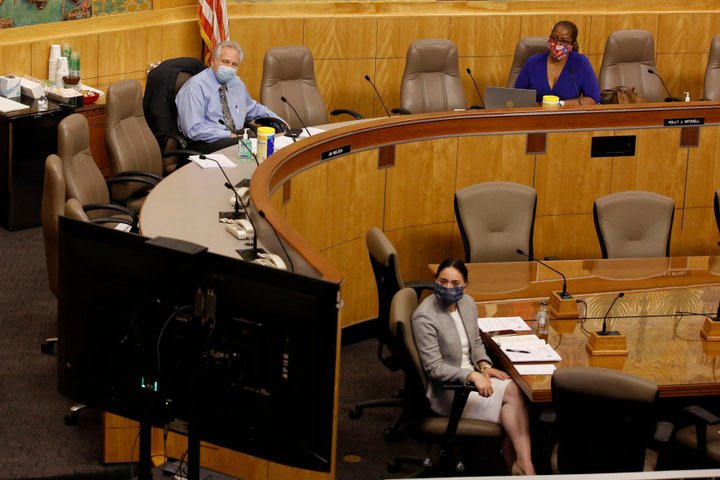
California senators Jim Nielson, left, and Holly Mitchell, right, sit six feet apart as they view a large video screen during a hearing of the special subcommittee on COVID-19 on April 16, 2020. The two were the only lawmakers to attend in person; other committee members, those testifying and the public joined by video. Photo by Rich Pedroncelli, AP Photo/Pool
###
With California in a pandemic-induced recession that will hammer the state budget, lawmakers grilled officials about Gov. Gavin Newsom’s $1.4 billion deal to buy masks and other protective gear — but got few answers during their first hearing on the state’s effort to stem the spread of coronavirus.
The meeting — with two senators in the Capitol and seven participating via videoconference — marked the Legislature’s first hearing since lawmakers left Sacramento in mid-March to work from home because of the pandemic. Senators wore face masks and the few reporters in the hearing room had their temperatures taken before they were allowed to enter. Lobbyists phoned in their comments rather than lining up behind a mic as they normally do. And the meeting started late because of a series of technical hiccups as the old-fashioned institution adapted to the internet age.
Behind their face masks and in front of their webcams, senators were visibly frustrated that the governor still has not released the contract he made with a Chinese company that is supposed to manufacture hundreds of millions of facial masks. Newsom announced the agreement more than a week ago on national TV.
“That’s a big deal, and many of us are going to be very insistent on seeing the terms of that contract. I must confess I have not much confidence in them being delivered,” said Sen. Jim Nielsen, a Republican from Gerber.
“There is not an expectation, but a demand that that contract become available,” he said.
Republicans were not the only ones pushing for answers. Democratic Sen. Richard Pan of Sacramento asked if Newsom’s administration would “be transparent about where the supplies are going” so Californians can be assured the gear is being properly distributed.
Christina Curry, chief deputy director of the Governor’s Office of Emergency Services, said that information would not be made public because the protective gear is in so much demand around the world.
“The concern with providing all of that information publicly is… (personal protective equipment) is very high value, highly desired, and it could potentially open up issues with questioning decisions or creating a process outside of what we have,” she said.
The contract would be made public, Curry said, after state officials “have assurance that the supply is going to be arriving and with the requirements we have set forth.”
It was a different answer than another Newsom aide provided earlier this week when asked when the contract would be released. On Monday, Mark Ghilarducci, Newsom’s director of the Office of Emergency Services, said the contract was “in the final negotiation phases” and would be released when the language was complete.
Newsom, speaking on the Rachel Maddow show on April 7, said the contract had already been “inked.”
The contract was not the sole focus of the hearing but was the clearest flashpoint between the Legislature and the governor’s staff. Though both branches of the state government are controlled by Democrats, it’s not unusual for them to quibble about how to spend taxpayer dollars as part of the annual budget process. What is unusual this year is that the Legislature ceded enormous power to Newsom, passing a coronavirus emergency measure that gave him power to spend up to $1 billion “for any purpose” related to the pandemic.
Newsom officials said at the hearing that they anticipate a need to spend another $6 billion on coronavirus response, but acknowledged they didn’t yet have a proposal for exactly how the money should be spent.
“The course of this pandemic is uncertain… so we ask for your patience on that,” said Vivek Viswanathan, a chief deputy director at Newsom’s Department of Finance.
Senators also questioned Newsom’s efforts to shelter homeless people who are vulnerable to catching and spreading the coronavirus. Newsom has given local governments $100 million to open new shelters and enhance social distancing measures at existing shelters, and is spending $50 million on hotels, motels, and trailers.
But a lot of cities with large homeless populations are not getting the money, Sen. Nancy Skinner said, because the formula for distributing funds favors big cities.
“There are still significant numbers of unsheltered people not getting access to these hotel rooms,” said Skinner, a Berkeley Democrat.
The broader context for the hearing — and a subject that is certain to consume most of the Legislature’s attention in the coming months — was the dire financial situation that California is facing because of the economic devastation caused by the pandemic. Unemployment claims suggest that between 12% and 15% of Californians have lost their jobs in recent weeks, Legislative Analyst Gabe Petek said. The state is now in recession, he said. So the government faces not only a drop in revenue from taxpayers but also greater demand for government services such as health care and food assistance.
“It’s very likely that the state has gone from an anticipated surplus and is now likely facing a budget problem and potentially a significant one,” Petek said, before clarifying what that means: For the first time in several years, the state will likely have less money than it’s committed to spend. Cuts, it appears, are on the horizon.
###
CALmatters.org is a nonprofit, nonpartisan media venture explaining California policies and politics.
CLICK TO MANAGE